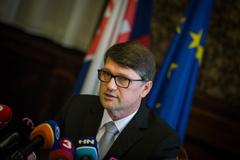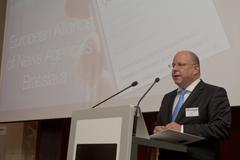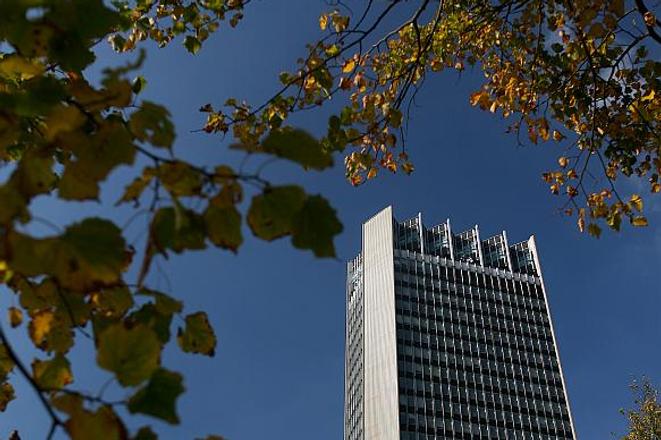“If I won the election, I would scrap concessionaire [fees] and I would not play the public-service games.”
Parliamentary Speaker Andrej Danko said that on April 9 on the TA3 private news channel as he unveiled his plan for the public-service Radio and Television of Slovakia (RTVS) to become a state institution. This is the furthest he has gone in his statements about the RTVS since he started trying to gain some control over the broadcaster.
The pressure that two of Slovakia’s top constitutional officials, Parliament’s Speaker Danko and Prime Minister Robert Fico, have asserted on the public-service broadcaster has prompted commentators to point to the attitude of the ruling power towards the media in Slovakia’s neighbouring Hungary and Poland, and has generated substantial concerns about press freedom in Slovakia.

Press freedom concerns
The International Press Institute (IPI) condemned particularly the statements of Prime Minister Robert Fico who has repeatedly stated over the past weeks that he wants to see a change in the top post of the Radio and Television of Slovakia (RTVS).
“I will give clear guidance to the MPs to make a change at the helm of the RTVS,” Fico said on April 6 in the parliament.
The IPI labelled Fico’s RTVS-related efforts as “inappropriate and unwise”in a reaction published on April 12. The public-service broadcasters cannot fulfil their vital role unless they are independent from political interference, IPI Director of Advocacy and Communications Steven M. Ellis said.
“The prime minister’s call for parliament to interfere in RTVS’ operations risks the broadcaster’s independence and raises the troubling spectre of it becoming a pro-government mouthpiece,” Ellis said and added that Fico as an elected leader needs to accept the “higher degree of scrutiny and the tough questions that come with the job” rather than “seek to use his power to silence critics”.
Fico is discontented
In another of his highly critical comments about the media in Slovakia, PM Fico accused the media in general of publishing only critical information about the government and avoiding the positive news.
“I’m sorry but it pisses me off how you report the affairs of this state and what kind of image is created; it is impossible, even unacceptable,” Fico said during a discussion organised by the Hospodárske Noviny daily on April 5.
This time, Fico targeted mainly the RTVS and said that it is no longer a public-service and that the current management has failed to fulfil this task.
“I consider the news service of the RTVS opposition-oriented. There should be a change at its helm,” he said.
Getting ready for a vote
The current RTVS general director Václav Mika reacted with a letter that he sent to the RTVS staff in early April, in which he announced he will run as a candidate to be re-elected to his post.
The RTVS general director is elected in a secret ballot in the parliament. The election is scheduled for June 22, and the parliament is accepting applications until May 10. The MPs from the parliamentary culture and media committee are planning to hold hearings of the candidates on May 30. The candidate who receives more than half of the votes of all MPs present will be elected the new RTVS general director. If none of the candidates gets the necessary number of votes, the broadcaster will be led by its current programme director Tibor Búza and the election process will start anew.
Mika and Rezník are mentioned as the two main candidates. Rezník, who formerly led the public-service Slovak Radio (before it was merged with the public-service TV and RTVS was created), confirmed his candidacy on April 12. He also ran in the previous election in 2012 and lost to Mika, who was endorsed by Culture Minister Marek Maďarič.
Mika’s re-election is, however, highly questionable, with SNS and part of Smer (including the prime minister) against him. Most-Híd is the only coalition party that has not put any pressure on Mika, but its politicians have suggested in interviews with the Sme daily that the change in the RTVS top post will probably be one of the compromises that they will have to make.
“Such a colourful coalition has its taxes and this is probably one of them,” prominent Most-Híd MP Gábor Gál told Sme.
Director, not content
Most-Híd’s chair Béla Bugár, meanwhile, insists that the politically-motivated change of the general director does not necessarily mean a political influence over the public-service broadcaster’s news service.
“I am aware of the discontent with the current director, so I suppose a change will come. But that is the only place where they can interfere,” Bugár told Sme.
Ivan Godársky, media and legal consultant at the non-governmental MEMO 98 media watchdog, admitted that the director is important, but often not defining.
“He or she sets a certain vision, direction, or culture of the institution,” Godársky said. Media and journalists covering political news mostly do not accept political control or dirigisme any longer. Professionalism and ethics are the main criterion for them, Godársky believes.
A compromise candidate?
Coalition partners discussed the RTVS director election on Monday, April 10. Most-Híd is for now not willing to support Rezník, whom SNS is expected to endorse.
The culture minister, meanwhile, does not have many allies among the Smer MPs who would vote for Mika despite Fico, particularly as the Smer caucus is known for its unison voting, regardless of the election being secret or public, the Denník N daily wrote.
The opposition wants to agree on a candidate they will support jointly and did not rule out this could be Mika or any other candidate who will apply. Speaking to Denník N, most opposition politicians agreed that the most important thing now is to prevent the SNS from gaining control over the broadcaster.
Rezník made headlines in early April after it transpired that the state-run newswire TASR that he is the director of, signed a contract with the Russian newswire Sputnik, a known producer of hoaxes that are part of the pro-Russian propaganda. After a wave of harsh criticism, TASR withdrew from the cooperation.

“The fact that the contract was signed (and cancelled only after the pressure of a significant negative response), suggests quite clearly that the public interest could be under serious threat if he were elected,” Godársky said.
Politicians do not understand
While Mika’s tenure has had its darker moments, among them the sudden withdrawal of the popular late-night debate Pod Lampou, which Godarsky mentioned, generally speaking the public seems to be reacting positively to Mika’s RTVS.
Contrary to the criticism from Fico and Danko, in 2016, RTVS recorded its best audience share in the past twelve months, for the first time in years.
RTVS’ main news TV programme was evaluated as the most objective on the Slovak market for the first time in years, based on a survey by Median SK made between July and September 2016, in which 24 percent of respondents preferred RTVS.
The main problem that Godársky describes about the whole RTVS dispute is that politicians like Fico and Danko do not seem to understand the role of the media in democracy in general, and public-service media in particular.
“To think that by ‘promoting’ one’s own, or one’s loyal person I will get control, is the thinking from the past regime and it shows what the manners of the individual politicians are,” said Godársky.
According to the analyst, the two politicians are clearly “captured in a different societal framework - the politician on the top of the pyramid, and all the others, including the media, should obey this hierarchy and behave accordingly.”
“But democratic standards are something else - politicians govern the public affairs in the name of people and out of their will, the media do not belong to them, quite the contrary, in a democracy they have the role of guardians to check whether the elected representatives govern the affairs in the way that they have committed themselves to,” Godársky said.



 The building of the public-service television in Bratislava. (source: Tomáš Benedikovič - Sme archive)
The building of the public-service television in Bratislava. (source: Tomáš Benedikovič - Sme archive)